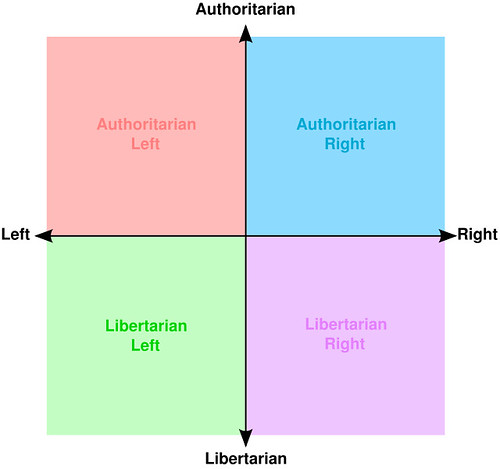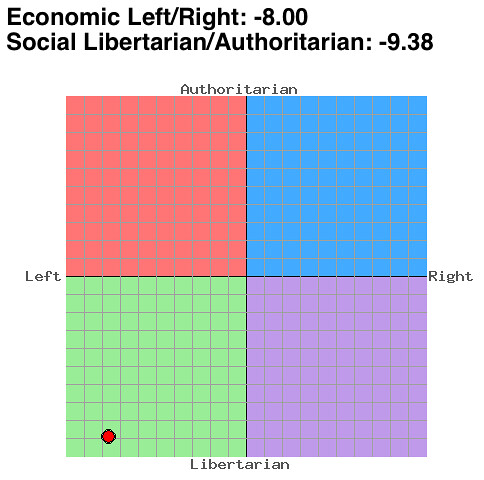“All two-valued systems are false.” — Gene Wolfe
Consider the left-right continuum of political thought. It often strikes me as tired and played-out. Yet at other times it seems quite relevant. It certainly is one-dimensional, by definition, and thus it can’t begin to reflect the rich variation and nuances of political philosophy. For example, Nazis and Bolsheviks would be at opposite ends of this spectrum, but don’t they have a lot in common? Something important is missing.
At some point during my undergraduate years, a professor introduced me to a dual-axis model of politics. It doesn’t abandon the well-known left-right continuum. It simply adds another dimension, call it an up-down continuum. Up represents a more authoritarian tendency; down represents the opposite inclination, which might be called libertarian. (Note the small “l” to avoid confusion with the Libertarian Party.) I’m not sure, but I think this model may have first been articulated by the famous psychologist Hans Eysenck.
The result looks something like this:
This clears up some things. Hitler and Stalin would both be at the top of the chart, but in opposite corners.
Of course you could get even more complex. You could add an urban-rural axis or a pacifist-militant axis, to name just a couple. But that quickly gets cumbersome. This dual-axis model seems to work pretty well for me. I’ve carried this mental construct around for the last twenty years, and I find it helpful. I just wish more people knew about it.
Well, turns out there’s a website that allows you to take a short quiz and plot yourself on this model. No, I’m not talking about The World’s Smallest Political Quiz. I’m referring to The Political Compass.
If you haven’t already done so, hie thee to their website and take the test. See where they map you. Does it correspond with where you’d have plotted yourself?
I had some quibbles with the way some of the propositions were framed, but I can’t argue with my result:
That’s me in the corner. This is consistent with how I see myself, anyway. Whatever the merits of the test, I think the model is the important thing.
Since I’m so very far to the left, you might think I’d be a huge booster for the Obama campaign. After all, we keep hearing how he’s the most liberal member of the Senate.
But if you poke around on the Political Compass website, in particular their analysis of our current presidential race, you will begin to see why I’m registered Green, and why I feel so alienated from the major party candidates.


I’m to the left of you, Gandhi, and the Dalai Lama, but less libertarian.
Economic Left/Right: -8.25
Social Libertarian/Authoritarian: -6.62
I’m somewhere down in that corner too. I’m voting for Obama, but that’s sort of another story.
I’m with you and Mike, B!
Economic Left/Right: -2.88
Social Libertarian/Authoritarian: -2.15
Some of those questions are quite interesting!
Good as the test is, I think it misses some nuances, so I’d be interested to see how Obama’s actual test would compare to their version of his beliefs. By their lights I guess the vast majority of elected officials are probably ‘authoritarian.’
I took it years ago and was further from the center – this time I was more middle of the road. Economic Left/Right: -3.12
Social Libertarian/Authoritarian: -4.77
I’m slightly to the right of you and Homan who is from another galaxy…
Economic Left/Right: -4.88
Social Libertarian/Authoritarian: -3.79
Wow, thought I was a little closer to center than that. I think I slid down the social libertarian scale cause I don’t care what people do in their bedroom.
I don’t see how a two-axis system is a significant improvement; still seems like a bunch of false choices to me, and the questions were so aggravating I couldn’t get past page two.
So instead of being JUST coke vs. pepsi, we can determine whether one prefers corn syrup or saccharine as a sweetener… how considerate to allow us to decide who should benefit from the accepted inevitability of globalization; how considerate to allow us to choose whether we should have rampant corporate power or corporate power tempered by government control…
you’re a good guy, B., but this is bullshit.
Economic Left/Right: -4.12
Social Libertarian/Authoritarian: -3.95
Maybe cuz it’s one in the morning, but I’m not sure what to make of this. Still, it was interesting!
So not surprised being that I’m a libertarian, but – I’m more socially liberal than Gandhi, and more economically conservative than Margaret Thatcher! Hahah!
My father-in-law took the test too, but he was to shy to post his results here directly:
Economic Left/Right: -3.12
Social Libertarian/Authoritarian: -4.77
So I’m almost dead center in the Left/Libertarian quadrant:
Economic Left/Right: -4.38
Social Libertarian/Authoritarian: -5.74
And like you, B, I cannot vote for McCain or Obama because I have serious problems with the course of our country. All the mess we’re in right now is not because a Republican was in the White House or because a Democrat preceded him in the White House: it’s because the Democrats and Republicans have been sharing absolute power for almost a century.
Time for CHANGE, indeed. Vote GREEN.
Peace,
Tim
B:
I’ve been thinking about this dual axis a lot lately, with all the interesting post-election discussion. I just can’t figure out what “left” and “right” mean, esp. in light of the “authoritarian”/”libertarian” axis.
I mean, I think of fiscal authoritarianism as high taxes, a glut of govt-provided services, regulation on everything. Is this what they mean by “left”, the abdication of personal responsibility to the all-serving state? Where the role of govt is to “protect” the citizens?
And what does “right” mean? Low taxes, laissez faire capitalism, hardly any govt service except for basics (roads, defense, police, schools, et al.)? Where the role of citizens is to be protected *from* the govt (e.g., “Congress shall make no law…” –a thing of beauty, BTW)? I think of this as fiscal libertarianism.
I think tricking oneself into believing that simply saying “left” is just the opposite of “right” is inaccurate. IMO, left is a form of authoritarianism in its own right.
Which leaves the other axis. Is that for “social libertarianism” and “social authoritarianism”? And if so, to be honest, I think there is a libertarian case to be made for some positions people would hold as authoritarian. Like abortion. IMO, the libertarian case for life is that abortion asserts one person’s liberty (the mother) over another person’s liberty (the baby). Of course, I understand that some people think that isn’t a baby until it comes out–but instead of getting too far afield with that, just empathize for a second how I would think of something like Roe, based on the life principle, as being authoritarian in its own right. Or state sanctioning of “marriage”, gay or otherwise. For the state to stick its nose in it–frankly, that’s authoritarian, IMO, but maybe some people think that’s “libertarian.”
My gut reaction is to think that (what I consider radical) leftists, e.g., the Green Party, are completely prescriptive and authoritarian. But because you want to legalize ganja or sanction gay marriage, that makes you some kind of libertarian. Hardly, IMO. It makes you a fiscal authoritarian first and foremost. But maybe I have the GP all wrong. Maybe they are for personal responsibility and individualism.
You could also pit individualism against collectivism. Etc. There are so may ways to slice it. I wish there was an easy way to boil it all down, but there isn’t.
Garvey, it’s not surprising that you conflate leftism and authoritarianism.
I believe the folks behind Political Compass mean the left-right axis mainly as an economic dimension. For the Left, think Marx and Proudhon.
Proudhon doesn’t get nearly as much credit, but his ideas on property were seminal. In a nutshell, he was a strong advocate for private property, but he was critical of the abstraction of the idea, the system whereby people own property (land) they don’t occupy or use in any way.
With Marx, we’re talking the labor theory of value — the “dictatorship of the proletariat” is obviously authoritarian, but the labor theory of value can be considered independently and is the basis of much leftist thinking.
Except for the most pure anarchists, most on the left probably believe government has a role to play in economics. The anti-authoritarian leftist wants severe limits on state power, but may see a role for gov’t as the best means of protecting and maintaining the public sphere. Of course there are plenty of anarchists who want to see the state abolished.
If I might offer a critique to balance yours, I’d hazard a guess that your personal blind spot is the inherently authoritarian nature of capital, and how dependent capitalism is on the state. I’ve argued that the primary role of the state is actually the preservation and maintenance of property “rights.” You probably see it as the redistribution of wealth.
B: I appreciate your thoughts very much. I agree with your notion in the last paragraph that capitalism is dependent on the state. And the natl debt strengthens that argument. I could also see how someone could say a “muscular foreign policy” is nothing more than a shakedown of the world in an attempt to back such a system, to ensure our continued solvency, etc. Of course, that alone won’t do it. A lot of problems arose when we opted out of straight barter and used govt backed paper money as the middleman. We made the middleman a powerful party to the transaction which it really had almost no hand in assisting/producing in the first place.
On an individual or personal level, I probably subscribe to the Walter Williams view that capital is proof of having served one’s fellow man. At least that’s how it’s played out for me, personally.